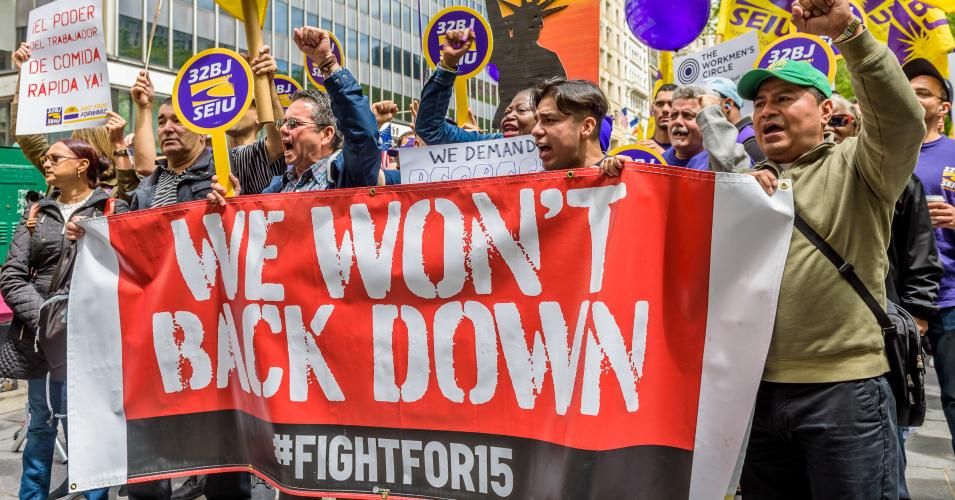
While voters on a national level handed control of the House to Republicans in the midterms, they simultaneously decisively backed stronger state and local protections for workers—from a $15 minimum wage in Nebraska, to banning so-called right-to-work laws in Illinois, to finally prohibiting involuntary servitude in four states. With Washington returning to divided government, states and cities will be the frontlines of progress as workers organize to demand new solutions to improve their jobs and lives. The past few months provide a road map for what that is likely to look like, as workers across the country—especially Black and brown workers facing some of the worst job conditions—have been fighting for and winning important new policies at the state and local levels to promote better jobs, a greater voice at work, and protection from the worsening climate crisis.
Even in states with Democratic legislatures, well-financed industry opponents are pulling out the stops to try to fight new worker protections.
Take, for example, the perennial problem of job sectors where pay and benefits are low, violations of workers' rights widespread, and where workers of color are most concentrated. These conditions are often worst in highly "fissured" industries where practices such as franchising and subcontracting insulate the big companies that make most of the profit from responsibility for how workers are treated. This year California's overwhelmingly Black and Latinx fast food workers won landmark legislation establishing a sectoral standards board, which will include representatives of employers, franchisers, workers, and members of the public, and will be empowered to negotiate legally binding job standards for improving conditions in the industry. Nail salon workers in New York—a sector where a largely Asian American and Latinx workforce faces low pay and dangerous chemicals—are now campaigning to replicate this promising model for their industry.
As the climate crisis leads to more frequent floods, fires, heat waves, and other emergencies, a growing problem workers face is employers that force them to stay on the job rather than allowing them to flee to safety—with predictably tragic consequences that have cost workers their lives. In response, workers in Miami and more recently in California have fought for and won "right to refuse" laws to protect workers from being fired or punished for refusing to stay and work under such conditions. And workers in Colorado and Oregon have won urgently needed state OSHA standards protecting them against extreme heat or smoke on the job, and workers are calling for Washington State to make a similar emergency protection permanent.
As rapidly rising consumer prices erode the value of the minimum wage—even in states that raised it to $15—workers are demanding and winning raises far beyond $15. Hawaii workers this year won an increase to $18 an hour over several years. And in New York, a broad worker-led campaign is fighting for a $21 minimum wage, which would update the state's $15 wage to catch it back up to where it would have been if it had been adjusted consistently both for inflation and—in a key best practice—for labor productivity growth in recent years.
Finally, unemployment insurance systems in states across the country are unprepared to support workers and local economies in the event of a recession. In too many states, unemployment insurance is difficult to access, excludes underpaid workers and workers of color, pays inadequate benefits, and cuts off support before workers have time to find new jobs. In Colorado this year, in what may be a model for other states, workers fought for and won key reforms as part of a grand bargain to keep unemployment taxes on employers low. The reforms include a new program to assist workers who are excluded from regular unemployment because of their immigration status, and improved benefits for workers whose hours are slashed to part-time, among others.
But none of these worker wins come easy. Even in states with Democratic legislatures, well-financed industry opponents are pulling out the stops to try to fight new worker protections. We saw this in New Jersey last month where Black and immigrant temp workers—an industry where abuses and discrimination are pervasive—won passage of precedent-setting temp worker protection legislation to guarantee temp workers key safeguards including pay parity with non-temp workers. But after the bill was sent back to the legislature for technical reasons, lobbyists then pressured a couple of legislators to change their votes, suddenly putting the whole package in jeopardy. A similar pattern is playing out in California where the fast food industry is spending big money to put a repeal of the landmark fast food worker sectoral standards legislation on next year's state ballot.
With Washington's ability to innovate stymied by gridlock, wins like these by workers organizing for racial justice, a greater voice at work, and protection from the climate crisis will lead the way in showing how states and cities can respond to workers' demands for the types of decent jobs we all deserve.
This content originally appeared on Common Dreams - Breaking News & Views for the Progressive Community and was authored by Paul Sonn.
Paul Sonn | Radio Free (2022-12-05T16:43:45+00:00) The Midterms Mean Cities and States Are Where Workers Must Fight to Improve Their Jobs. Retrieved from https://www.radiofree.org/2022/12/05/the-midterms-mean-cities-and-states-are-where-workers-must-fight-to-improve-their-jobs/
Please log in to upload a file.
There are no updates yet.
Click the Upload button above to add an update.